
Journal Menu
► ▼ Journal Menu-
- Sustainability Home
- Aims & Scope
- Editorial Board
- Reviewer Board
- Topical Advisory Panel
- Instructions for Authors
- Special Issues
- Topics
- Sections & Collections
- Article Processing Charge
- Indexing & Archiving
- Editor’s Choice Articles
- Most Cited & Viewed
- Journal Statistics
- Journal History
- Journal Awards
- Society Collaborations
- Conferences
- Editorial Office
Journal Browser
► ▼ Journal BrowserNeed Help?
Announcements
8 July 2025
Meet Us at the AOGS2025 22nd Annual Meeting, 27 July–1 August 2025, Singapore
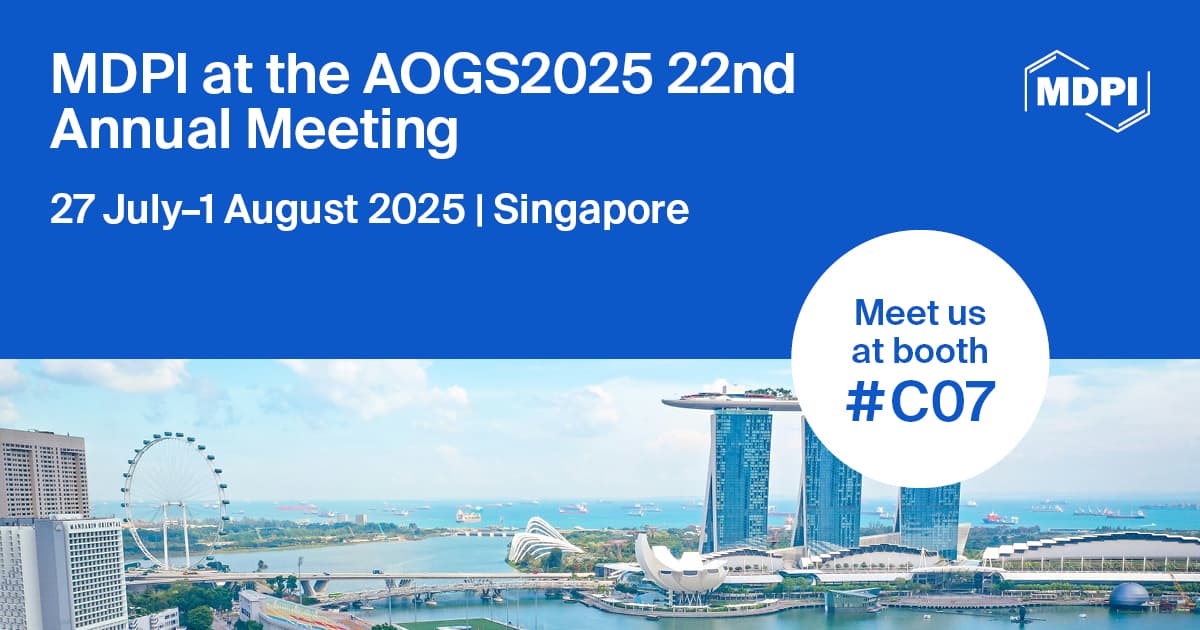
Conference: AOGS2025 22nd Annual Meeting
Date: 27 July–1 August 2025
Place: Level 4, Sands Expo and Convention Centre, Marina Bay Sands, Singapore
MDPI is excited to announce its participation as an exhibitor at the 22nd Annual Meeting of the Asia Oceania Geosciences Society (AOGS2025), taking place in Singapore from 27 July to 1 August 2025.
This prestigious conference brings together scientists, researchers, and practitioners from across eight geoscience disciplines: atmospheric sciences (ASs), biogeosciences (BGs), hydrological sciences (HSs), interdisciplinary geosciences (IGs), ocean sciences (OSs), planetary sciences (PSs), solar and terrestrial sciences (STs), and solid earth sciences (SEs).
In addition to a robust program of scientific presentations and exhibitions, AOGS2025 will feature a variety of engaging ancillary activities—including workshops, panel discussions, special sessions, and field trips—designed to offer a well-rounded and enriching experience for all participants.
One of the event highlights is "Speed Networking", which provides a unique opportunity for attendees and exhibitors to expand their professional networks through focused one-on-one meetings.
We look forward to connecting with the global geoscience community at AOGS2025!
The following MDPI journals will be represented:
- Drones;
- Geomatics;
- Earth;
- Geosciences;
- Water;
- Remote Sensing;
- Environments;
- Climate;
- Hydrology;
- Limnological Review;
- Coasts;
- Journal of Marine Science and Engineering (JMSE);
- Sustainability;
- Oceans;
- Atmosphere.
If you are planning to attend this conference, please feel free to start a conversation with us. Our delegates look forward to meeting you in person and answering any questions that you may have. For more information about the conference and our booth, please visit https://www.asiaoceania.org/aogs2025/public.asp?page=home.asp.
8 July 2025
Meet Us at the 2025 Science and Technology Annual Meeting of the Chinese Society for Environmental Sciences, 18–20 July 2025, Nanjing, China
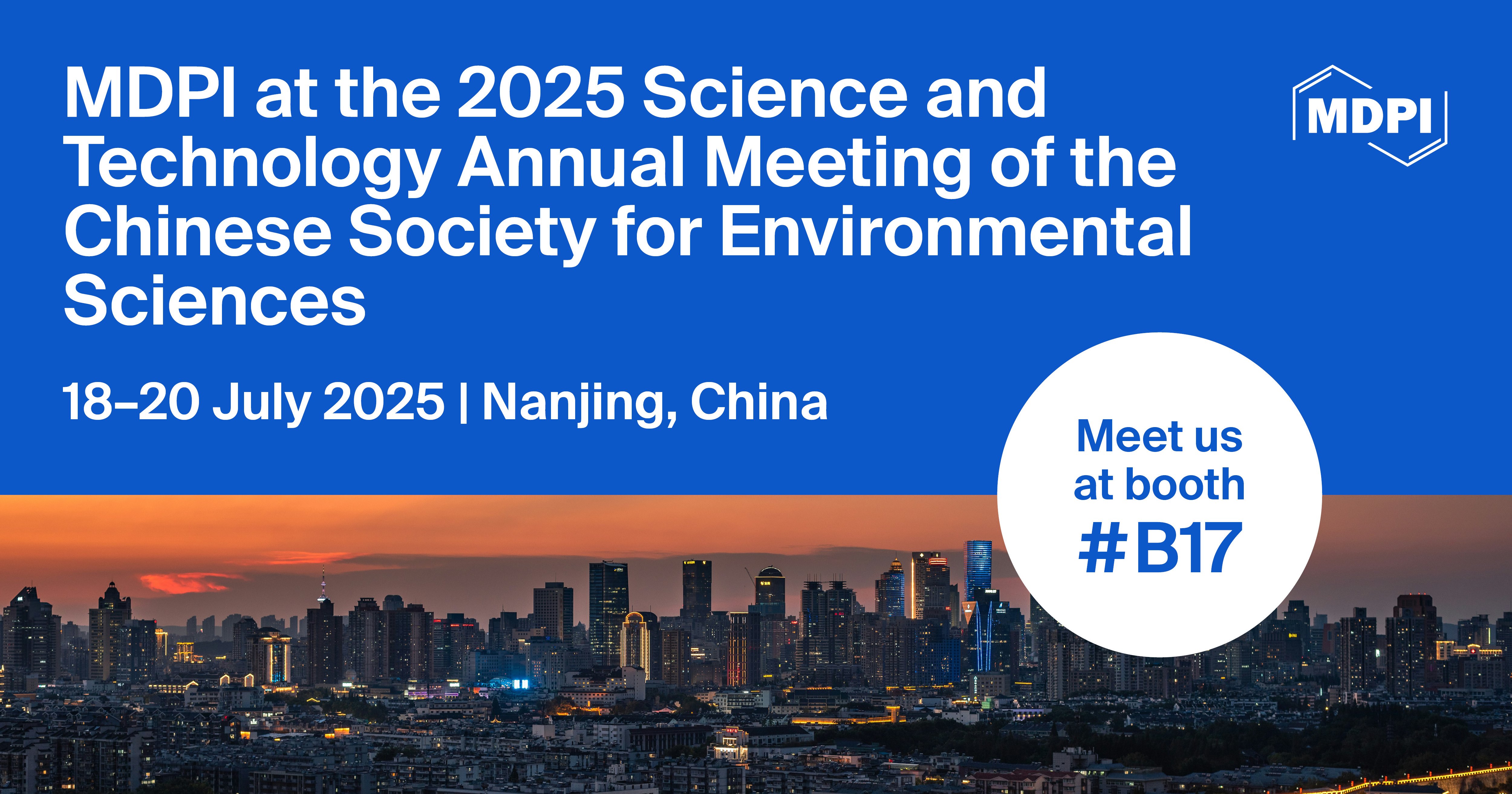
Conference: 2025 Science and Technology Annual Meeting of the Chinese Society for Environmental Sciences
Date: 18–20 July 2025
Location: Nanjing, China
MDPI will be attending the 2025 Science and Technology Annual Meeting of the Chinese Society for Environmental Sciences as an exhibitor, welcoming researchers from diverse backgrounds to visit and share their latest ideas.
The above conference is organized by the Chinese Society for Environmental Sciences. The 2025 Science and Technology Annual Meeting of the Chinese Society for Environmental Sciences, which will take place in Nanjing, China, themed "Leading Green Technology Innovation to Boost Beautiful China", will serve as a platform for sharing forward-looking insights and future visions. The conference aims to advance research in ecological and environmental sciences, promote technological innovation, foster disciplinary development, and contribute to the progress of ecological civilization.
The following MDPI journals will be represented at the conference:
- Atmosphere;
- Sustainability;
- Ecologies;
- Gases;
- Land;
- Conservation;
- Diversity;
- Earth;
- Eng;
- Environments;
- Hydrology;
- Technologies.
4 July 2025
MDPI’s Newly Launched Journals in June 2025
Six new journals covering a range of subjects launched their inaugural issues in June 2025. We are excited to be able to share with you the newest research rooted in the value of open access. We are pleased to present the latest research and to make it accessible to all.
We extend our sincere thanks to all the Editorial Board Members for their commitment and expertise. Each journal is dedicated to upholding strong editorial standards through a thorough peer review process, ensuring impactful open access scholarship.
Please feel free to browse and discover more about the new journals below.
| Journal | Founding Editor-in-Chief | Journal Topics (Selected) |
 |
Prof. Dr. Chang-Pu Sun, China Academy of Engineering Physics, Beijing, China; Computational Science Research Center, China Editorial | View inaugural issue |
quantum information and phenomena; condensed matter physics and statistical physics; atomic, molecular, and optical physics; computational physics and mathematical methods View journal scope | Submit an article |
 |
Prof. Dr. Hualiang Lin, Sun Yat-sen University, China; Prof. Dr. Jose L. Domingo, Universitat Rovira i Virgili, Spain Editorial | View inaugural issue |
green and organic food; green infrastructures; green exercise; environmental impact of the healthcare sector; effects of climate change on human health | View journal scope | Submit an article |
 |
Prof. Dr. Francesco Veglio, University of L’Aquila, Italy Editorial | View inaugural issue |
ultra-pure substances; water purification; air purification; gas purification; inorganic chemical purification; purification technologies View journal scope | Submit an article |
 |
Prof. Dr. Junxing Zheng, Huazhong University of Science and Technology, China Editorial | View inaugural issue |
computer-aided design and engineering; artificial intelligence and machine learning; building information modeling (BIM) and digital twins; robotics and automation in construction; smart sensors and Internet of Things (IoT); intelligent control systems and facilities management View journal scope | Submit an article |
 |
Prof. Dr. Assunta Di Vaio, University of Naples Parthenope, Italy Editorial | View inaugural issue |
sustainability, managerial, and biodiversity accounting; carbon management accounting; corporate social responsibility; artificial intelligence and disclosure View journal scope | Submit an article |
 |
Prof. Dr. Changjun Liu, Sichuan University, China Editorial | View inaugural issue |
bioeffects of electromagnetic waves; electromagnetic science and engineering; microwave, millimeter-wave, and terahertz technologies; metamaterials and metasurfaces; communication, sensing, and networks; energy, power, and sustainable applications; quantum and emerging technologies; artificial intelligence and advanced fabrication View journal scope | Submit an article |
2 July 2025
MDPI INSIGHTS: The CEO's Letter #24 - 2024 Impact Factor & CiteScore, MDPI Summits France & USA, Tu Youyou Award

Welcome to the MDPI Insights: The CEO's Letter.
In these monthly letters, I will showcase two key aspects of our work at MDPI: our commitment to empowering researchers and our determination to facilitating open scientific exchange.
Opening Thoughts

MDPI’s 2024 Impact Factor Highlights
For those of our readers who are new to academic publishing, you may have heard some news in June around the Impact Factor release. Every year, typically in June, Clarivate releases its annual Journal Citation Reports (JCR), which include Journal Impact Factors (JIF). This metric is widely used in academic publishing to reflect the average number of citations received by recent articles in each journal.
While Impact Factor is just one of many indicators of journal influence, it remains a major milestone for authors, editors, and publishers. It’s used to assess journal visibility, researcher recognition, and scholarly reach. Throughout our international meetings and events, it’s clear that the Impact Factor is something many of our authors and editorial board members care about, as it can influence where they choose to submit an article and the funding they receive for their research.
“These results reflect the trust that the scholarly community places in MDPI”
MDPI’s 2024 Impact Factor Highlights
- 298 MDPI journals received a Journal Impact Factor.
- 60 journals earned their first-ever Impact Factor
- To put this in perspective: MDPI’s 60 new journal acceptances into the Web of Science was the second highest number of any publisher in 2024, behind Elsevier and ahead of Springer Nature. Our 87% acceptance rate for journals submitted to Web of Science shows the strength of our editorial process and our proven ability to develop journals aligned with Clarivate’s 24 evaluation criteria.
- Notably, Textiles, Mathematics, International Journal of Neonatal Screening, Smart Cities, Systems, and Pharmaceutics ranked in the top 10% in their respective categories, highlighting their growing influence and prestige within their academic fields. This shows that high-quality indexing goes beyond visibility; it upholds credibility and trust.
- 193 MDPI journals are now ranked in the top 50% (Q1/Q2) of their subject categories.
- What does this mean, and why is it important? Journals are ranked by quartiles within their field, based on their Impact Factor. Q1 represents the top 25% of journals in their category, Q2 the next 25%, and so on. Being in Q1 or Q2 shows that a journal is performing well relative to other journals in its category. Authors and institutions often look at quartile rankings when choosing where to publish – it’s an important indicator of visibility and recognition, within its respective category.
- 116 of our previously ranked journals increased their Impact Factor.
- 14 MDPI journals achieved an Impact Factor of 5.0 or higher, suggesting a high degree of influence and visibility.
These results reflect our staff's hard work: from our editorial and production teams to our indexing, communications, and data teams, and beyond. This also reflects the trust that the scholarly community places in MDPI, reinforcing the message that when researchers publish with MDPI, they publish with impact.
Open Access with Impact
As the leading fully open access publisher, our journals have received a total of 18.4 million citations in the Web of Science by the end of 2024, reflecting the growing reach and engagement of research published with MDPI. We are committed to making scientific research freely accessible to everyone, everywhere. With the support of more than 4.2 million contributing authors, we’re proud to support the global shift toward open access.
Further Reading
If you’d like to better understand how journals get indexed and why Impact Factors matter, please read this recent interview with Dr. Constanze Schelhorn (Head of Indexing). It gives you a behind-the-scenes look at the role our indexing team plays in supporting journal indexing and visibility.
You can also read our official news announcement shared last week: MDPI Journals in the 2024 Journal Citation Reports.
Thank you to everyone, from our authors and reviewers to our editors and internal teams, who contributed to the progress of our journal indexing in 2024. We’re continuing to build journals that are recognized and trusted across disciplines.
Impactful Research

MDPI Journals See Continued Growth in 2024 CiteScore Results
Continuing our indexing updates, I’m pleased to share that MDPI has achieved strong results in the latest CiteScore metrics, released on 5 June by Scopus. These results reflect the collective efforts of our editors, reviewers, authors, and internal teams, with their dedication to quality and visibility in scientific publishing. You can read the full announcement here.
2024 Highlights:
- 322 MDPI journals received a CiteScore (up from 274 last year).
- 283 journals (88%) are ranked in Q1 or Q2 of their subject categories.
- 237 journals (85%) saw an increase in their CiteScore compared to last year.
- 48 journals received a CiteScore for the first time.
- 39 journals are now placed in the top 10% of their subject areas.
“This growth highlights our commitment to supporting open, trusted science”
What is CiteScore and how is it measured?
CiteScore metrics are developed by Elsevier as an alternative to the Impact Factor. They measure the citation impact of journals and can be accessed freely on Scopus. The metric represents the yearly average number of citations to recent articles published in a journal. If you’re interested in learning more about citation metrics and how we use them, check out this blog post.
Why is this important?
These results show the growing recognition for, and impact of, MDPI journals across disciplines. CiteScore rankings help researchers, institutions, and funders assess where high-quality work is being published. This growth improves our journals’ positioning in the publishing landscape and highlights our commitment to supporting open, trusted science.
Inside MDPI

Highlights from the MDPI USA Summit in Boston (5–6 June)
With several Summits already behind us, I think this is a good time to reflect on the purpose of these Summits.
Why do we organize MDPI Summits?
These one-and-a-half-day, invite-only gatherings are designed to improve our relationships with Chief Editors who lead our journals and are respected voices in their fields. The Summits aim to:
- Share MDPI’s values, achievements, editorial practices, and local market collaborations.
- Collect feedback on MDPI operations and journal practices.
- Empower Chief Editors to confidently represent MDPI beyond the Summit.
While Chief Editors know their journals well, these events help them better understand MDPI. We want them to be ambassadors for our brand. The aim is for them to walk away informed, engaged, and equipped to share positively about MDPI.
|
|
|
|
About the Boston Summit
Held on 5–6 June, our first USA Summit gathered over 25 Chief Editors to learn more about MDPI’s activities and collaborations in the USA. The program included presentations, Q&A, and a panel discussion.
Agenda Highlights:
Moderated by Summer Huggard (Operations Manager [Toronto], MDPI), the program featured:
- MDPI Overview and USA Collaboration – Stefan Tochev (CEO, MDPI)
- AI in Publishing and MDPI's Actions – Feichi Lu (Junior Data Scientist, MDPI)
- MDPI Editorial Process and Research Integrity – Dr. Giulia Stefenelli (Scientific Communications Lead, MDPI)
- Panel Discussion – Stefan, Feichi, Giulia, Claudia
- Society Partnerships – Dr. Clàudia Aunós (Society Partnerships Senior Manager, MDPI)
- Voice of the Customer and Closing Remarks – Stefan Tochev (CEO, MDPI)
|
|
|
|
|
|
|
|
MDPI & the USA: Facts and Figures
- With over 216,000 publications, the USA is MDPI’s second-largest contributor after China.
- In 2024, the USA ranked 2nd in total submissions and 2nd in total MDPI publications, with more than 28,200 publications.
- As of 2020, the cumulative number of authors from the USA until April 2025 was 352,099.
- As at April 2025, there are more than 12,035 active Editorial Board Members (EBMs) from the USA, with 55% having an H-index over 26.
- Among them, 96 serve as Editors-in-Chief (EiC) and 218 as section-Editors-in-Chief (SEiC)
- MDPI has more than 920 Institutional Open Access Program agreements worldwide, with over 130 from the USA.

A special thanks to our Toronto team, and everyone who worked behind the scenes to make this event run smoothly.
Coming Together for Science

Highlights from the MDPI France Summit in Paris (12–13 June)
We completed our first MDPI France Summit in Paris last week, and it was a special event. Attendees were engaged from beginning to end, remaining after hours to network and collaborate.
|
|
|
|
Why a France Summit?
We chose to host a France Summit in view of the recent challenges MDPI has faced with the National Centre for Scientific Research (CNRS). What we took away from the event is that our authors and editors very much appreciate and enjoy working with us, but we need to address the concerns raised by CNRS, around Article Processing Charges (APCs) and the funding of gold open access publications.
“Our authors and editors very much enjoy working with us”
Some of the claims made in the June 2023 interview with Alain Schuhl, the Deputy CEO for Science at the CNRS, are simply not factual. For example, they state that MDPI’s “average APC charges per article are now around the same as Springer Nature’s.” Here is the relevant passage, reproduced verbatim:

This is not accurate.
A recent preprint analysing APC data from Elsevier, Springer Nature, Wiley, PLOS, MDPI, and Frontiers (2019–2023) shows that MDPI’s average APCs remain significantly lower than those of Springer Nature and several other major publishers.


The MDPI Summits are part of our outreach and communication efforts to address misconceptions and clarify MDPI’s position as one of the most accessible and affordable major gold open access publishers in the world.
Summit Overview
Held on 12–13 June, the France Summit gathered over 20 Chief Editors to learn more about MDPI’s activities and collaborations in France. Many of these editors are influential in their institutions and professional societies. Several also have connections to CNRS, which makes this an important opportunity to clarify how we operate and build trust through open and transparent communication and hopefully turn our editors into informed advocates of MDPI.
Summit Feedback
The feedback has been very positive, with most attendees completing the post-event survey and all rating the experience as Excellent or Good. A few highlights:
- “The whole thing was highly professional and, above all, provided quantified details that will allow us to better answer questions surrounding MDPI.”
- “The summit was an opportunity to meet personally various people directly engaged in the organization and policies of MDPI, which made it possible to clarify some important points concerning publishing with MDPI.”
- “Very well organized! A great opportunity to see all French MDPI partners and editors.”
Program Highlights:
Moderated by Miruna Adelina Nicolcioiu (Senior Conference Producer), the program featured:
- MDPI Overview and France Collaboration – Stefan Tochev (CEO)
- MDPI Editorial Process and Peer-Review Quality – Dr. Marta Colomer (Public Affairs Specialist)
- Institutional Partnerships and Open Access Funding Models – Becky Castellon (Institutional Partnerships Manager)
- AI in Publishing and MDPI's Actions – Daniele Raimondi (Data Scientist)
- Publication Ethics: Global Trends – Diana Cristina Apodaritei (Research Integrity Specialist)
- Closing Remarks – Stefan Tochev
- Panel Discussion – Diana, Becky, Prof. Dr. Patrick Da Cost, and Stefan
|
|
|
|
|
|
|
|
MDPI & France: Facts and Figures
- With over 51,000 publications, France is MDPI's tenth-largest contributor, and fifth largest among EU countries after Italy, Spain, Germany, and Poland.
- As of 2020, the cumulative number of authors from France until April 2025 was 87,592.
- As at April 2025, there are more than 2,800 active Editorial Board Members (EBMs) from France, with 59% having an H-index over 26.
- Among them, 22 serve as Editors-in-Chief (EiC) and 61 as section-Editors-in-Chief (SEiC)
- In 2024, IJMS, JCM, and Molecules were the top three MDPI journals in terms of submissions from French-affiliated authors.

Special thanks to our colleagues from Romanian offices for organizing this successful event.
Closing Thoughts

Richard DiMarchi and Rolf Müller Share the 2024 Tu Youyou Award
As we wrap up this month’s newsletter, I’d like to take a moment to recognize the winners of the 2024 Tu Youyou Award, presented by our journal Molecules. I am pleased to share that the 2024 Tu Youyou Award has been conferred upon Richard DiMarchi and Rolf Müller, in recognition of their significant contributions to natural products chemistry and medicinal chemistry.
I invite you to read the editorial co-authored by the Tu Youyou Award Committee, which highlights the significance of the award and the remarkable impact of the recipients’ research.
A sincere thank-you to the 2024 Award Committee for their dedication and selection process, and congratulations once again to this year’s honourees. Your work exemplifies the kind of research MDPI is proud to support and amplify.
|
About the Tu Youyou Award For further information about the award and the winners, please visit the Tu Youyou Award website. |
Chief Executive Officer
MDPI AG
1 July 2025
Meet Us at the 32nd International Cartographic Conference (ICC 2025), 17–22 August 2025, Vancouver, Canada
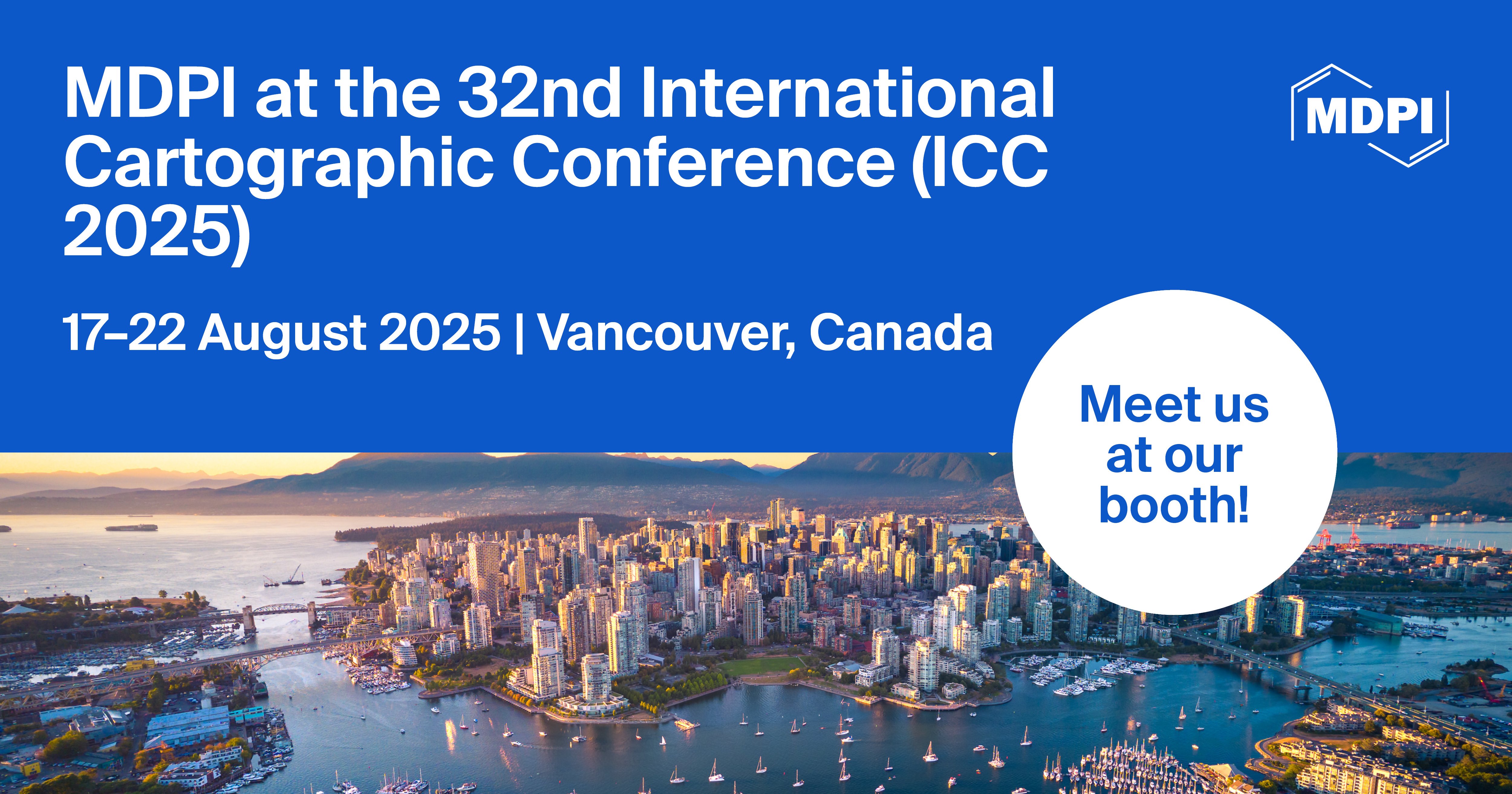
Conference: 32nd International Cartographic Conference (ICC 2025)
Organization: Canadian Institute of Geomatics
Date: 17–22 Aug 2025
Location: Vancouver, Canada
The Local Organizing Committee (LOC) of the International Cartographic Conference is delighted to announce that the 32nd International Cartographic Conference is coming to Canada and will be held at the Vancouver Convention Centre in Vancouver, British Columbia, from 17 to 22 August 2025. The theme for this conference is “Mapping the Future: Innovation, Inclusion, and Sustainability,” and it will be hosted by the Canadian Institute of Geomatics (CIG). The conference aims to serve as a forum where delegates can gather insights on scientific advancements, exchange expertise, and connect with peers in their respective domains.
The following open access journals will be represented:
- IJGI;
- Remote Sensing;
- Geomatics;
- Land;
- Earth;
- Forests;
- Imaging;
- Geographies;
- Atmosphere;
- Hydrology;
- Drones;
- Heritage;
- Data;
- Urban Science;
- Sustainability.
If you plan on attending this conference, please feel free to stop by our booth. Our delegates look forward to meeting you in person to answer any questions you may have.
For more information about the conference, please visit the following link: https://icc2025.com/.
26 June 2025
Meet Us at the RGS-IBG Annual International Conference 2025, 26–29 August 2025, Birmingham, UK
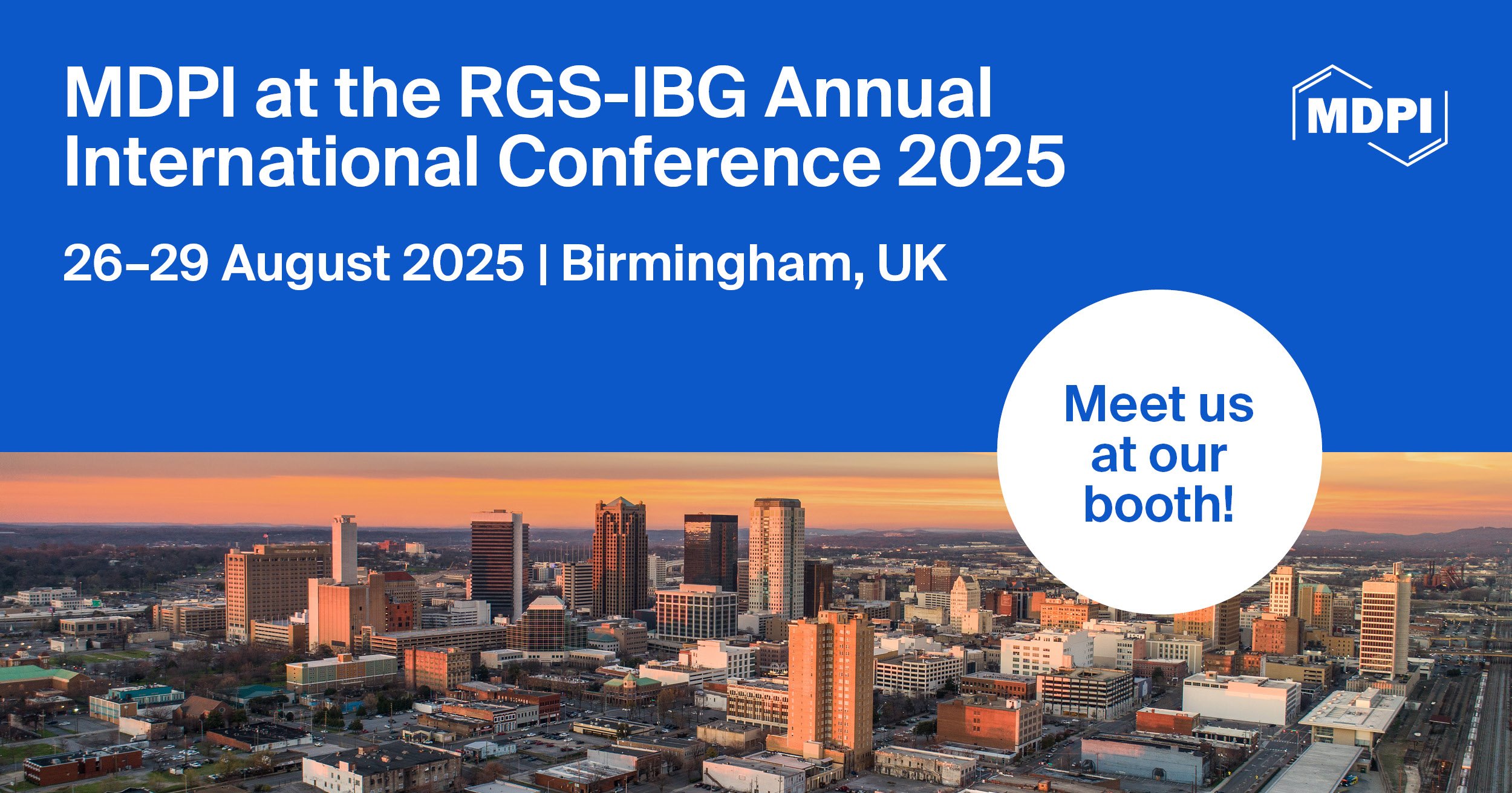
Conference Name: The RGS-IBG Annual International Conference 2025
Organization: Royal Geographical Society
Date: 26–29 August 2025
Place: Birmingham, UK
We will attend the RGS-IBG Annual International Conference 2025, which will take place at the University of Birmingham, and online, from 26 to 29 August 2025.
The RGS-IBG Annual International Conference regularly attracts over 2,000 geographers from around the world. The Royal Geographical Society serves an exceptionally wide range of public and professional audiences, including their 16,000 members. The Conference will be chaired by Prof. Patricia Noxolo (University of Birmingham, UK), and focuses on the theme of “Geographies of Creativity/Creative Geographies”. With over 400 sessions, we will hear from Black influencers working creatively with geographical ideas; from researchers using dance and storytelling; and from Midlands-based artists who will discuss how their sense of place contributes to their work.
The following open access journals will be represented at the event:
- Land;
- IJGI;
- Sustainability;
- Conservation;
- Earth;
- Forests;
- Geographies;
- GeoHazards;
- Geomatics;
- Hydrology;
- Quaternary;
- Remote Sensing;
- Soil Systems;
- Urban Science;
- Climate.
If you plan on attending this conference, please feel free to stop by our booth. Our delegates look forward to meeting you in person to answer any questions you may have!
For more information about the conference, please visit the following link: https://www.rgs.org/research/annual-international-conference.
24 June 2025
Meet Us at the Annual Meeting of the Ecological Society of America 2025, 10–15 August 2025, Baltimore, MD, USA
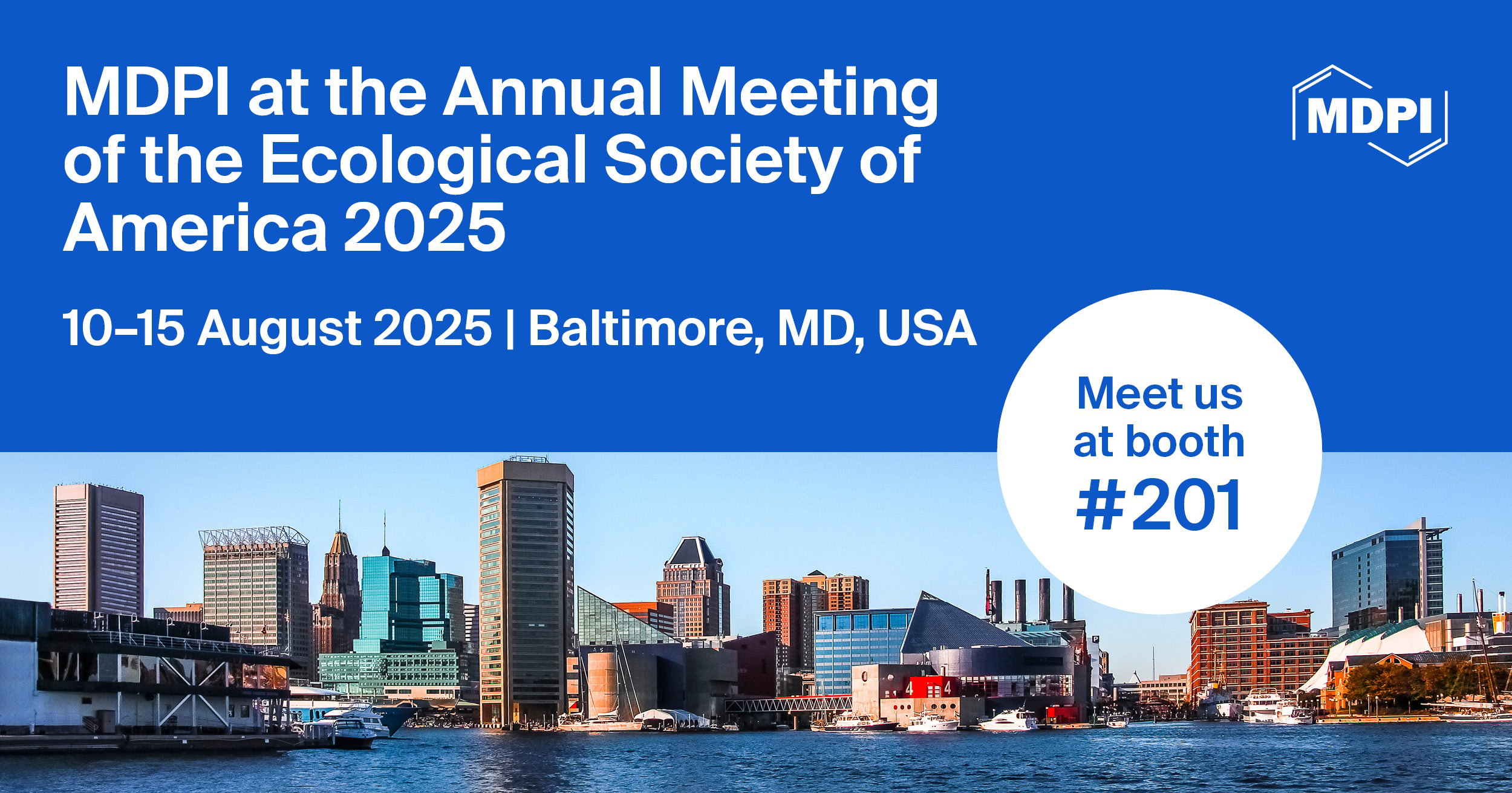
MDPI will be attending the Annual Meeting of the Ecological Society of America 2025, which will be held in Baltimore, MD, USA, from 10 to 15 August 2025.
The Annual Meeting of the Ecological Society of America invites all ecologists to come together and share new knowledge, learn from one another, meet old friends and make new ones, and grow professionally. This year’s meeting will emphasize society’s mission of supporting ecologists throughout their careers. The emphasis recognizes the need for us to continually invest in all the people who advance the science and practice of ecology. Among many other aspects of professional development, we are planning programming and inviting contributions that consider the transformational potential of effective mentorship.
The following MDPI journals will be represented:
If you plan on attending this conference, feel free to stop by our booth at #201. Our delegates look forward to meeting you in person to answer any questions you may have. For more information about the conference, please see the following link: https://www.esa.org/baltimore2025/.
17 June 2025
Sustainability Webinar | 2025 Sustainability Best Paper Award Ceremony, 18 June 2025
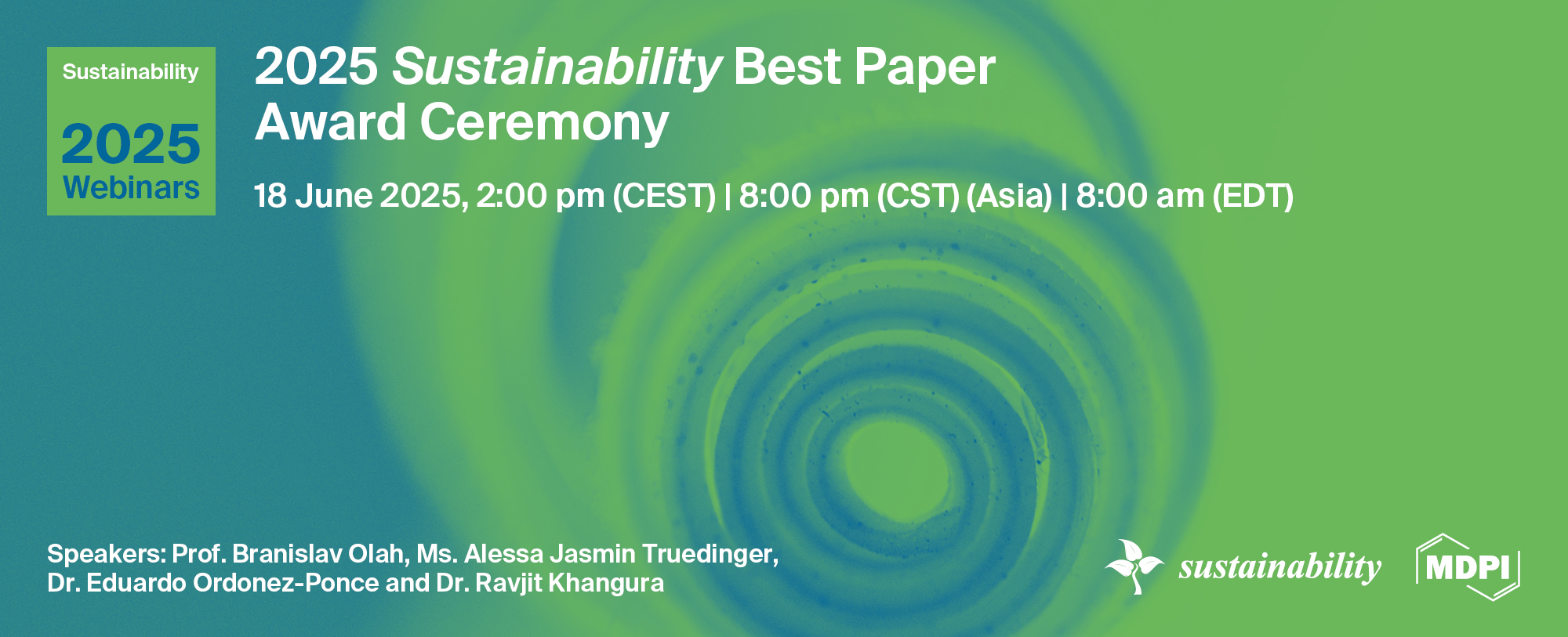
We are pleased to invite you to the Sustainability Best Paper Award Ceremony, featuring our winners from 2023, which will be held online at 2:00 p.m. CEST on 18 June 2025.
The Sustainability Best Paper Award recognizes applicants with high-quality papers of significant scientific merit and impact. During the ceremony, we will have the opportunity to learn more about the four award winners and hear their presentations on their recent research in the field of sustainability and sustainable development.
Date: 18 June 2025
Time: 2:00 p.m. CEST | 8:00 p.m. CST (Asia) | 8:00 a.m. EDT
Webinar ID: 856 9633 8208
Sustainability Best Paper Award
Sponsored by MDPI journal Sustainability (ISSN: 2071-1050), this award is granted annually to highlight publications of high quality, scientific significance, and extensive influence. All papers published in the Sustainability journal are eligible for this award (both regular and Special Issue submissions), and all applications will be assessed by an Evaluation Committee led by our Editor-in-Chief, Prof. Dr. Marc A. Rosen.
More information can be read at the following link: https://www.mdpi.com/journal/sustainability/awards/3165.
Register now for free!
| Speaker/Presentation | Time in CEST | Time in CST (Asia) | Time in EDT |
| MDPI Introduction | 2:00–2:10 p.m. | 8:00–8:10 p.m. | 8:00–8:10 a.m. |
| Prof. Branislav Olah Quantification of the Cooling Effect and Cooling Distance of Urban Green Spaces Based on Their Vegetation Structure and Size as a Basis for Management Tools for Mitigating Urban Climate |
2:10–2:30 p.m. | 8:10–8:30 p.m. | 8:10–8:30 a.m. |
| Ms. Alessa Jasmin Truedinger Resilience Building in Reconstruction: Lessons Learned from the Post–flood Recovery in the Ahr Valley in Germany |
2:30–2:50 p.m. | 8:30–8:50 p.m. | 8:30–8:50 a.m. |
| Dr. Eduardo Ordonez–Ponce Exploring the Impact of the Sustainable Development Goals on Sustainability Trends |
2:50–3:10 p.m. | 8:50–9:10 p.m. | 8:50–9:10 a.m. |
| Dr. Ravjit Khangura Regenerative Agriculture: Digging Deeper into the Literature |
3:10–3:30 p.m. | 9:10–9:30 p.m. | 9:10–9:30 a.m. |
| Q&A Session | 3:30–3:45 p.m. | 9:30–9:45 p.m. | 9:30–9:45 a.m. |
| Closing of Webinar | 3:45–4:00 p.m. | 9:45–10:00 p.m. | 9:45–10:00 a.m. |
After registering, you will receive a confirmation email containing information on how to join the webinar. Registrations with academic institutional email addresses will be prioritized.
Unable to attend? Register anyway, and we will let you know when the recording is available for viewing.
Webinar Keynote Speakers:
- Prof. Branislav Olah, Faculty of Ecology and Environmental Sciences, Technical University in Zvolen, Slovakia;
- Ms. Alessa Jasmin Truedinger, Institute of Spatial and Regional Planning, University of Stuttgart, Germany;
- Dr. Eduardo Ordonez-Ponce, Faculty of Business, Athabasca University, Canada;
- Dr. Ravjit Khangura, Department of Primary Industries and Regional Development, Australia.
For more information about this webinar, please visit the following link: https://sciforum.net/event/Sustainability-18.
16 June 2025
World Day to Combat Desertification and Drought—“Restore the Land, Unlock the Opportunities”, 17 June 2025
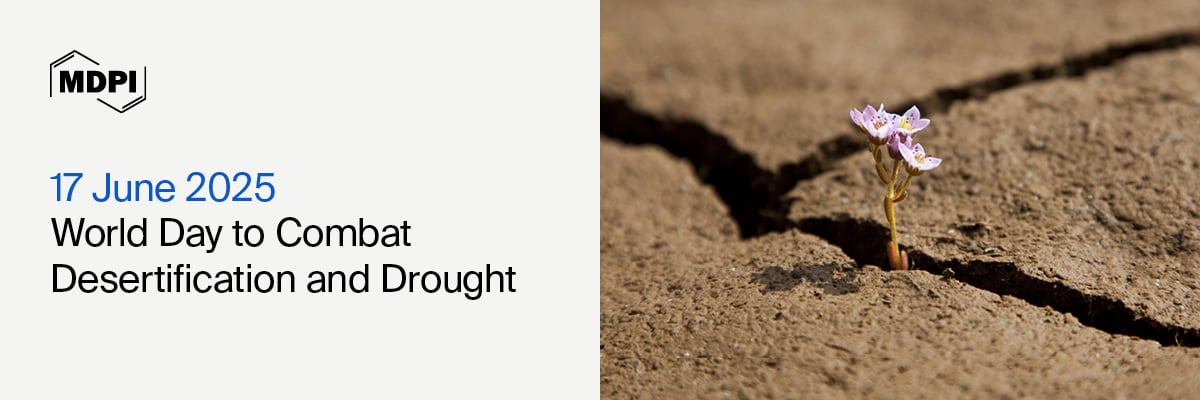
Desertification and drought continue to threaten ecosystems, food systems, and livelihoods around the world. As climate pressures rise, the need to protect and restore our land becomes increasingly urgent. The 2025 theme, “Restore Land, Unlock Opportunities”, shines a light on the vast potential that lies in healthy, resilient landscapes—from boosting food security to driving economic growth and environmental sustainability.
World Day to Combat Desertification and Drought calls on all of us—researchers, policymakers, and communities—to work together toward land restoration and drought resilience. Scientific research plays a critical role in shaping real-world solutions and inspiring action where it is needed most.
To support this global effort, MDPI is proud to feature selected articles from Atmosphere, Biology, Climate, Conservation, Ecologies, Environments, Hydrology, Land and Sustainability. These contributions explore key issues around land degradation, water scarcity, and climate change, helping to unlock the knowledge and innovation needed for a more sustainable future.

 |
 |
 |
 |
 |
 |
 |
 |
 |

“Response Characteristics of Biological Soil Crusts Under Different Afforestation Measures in Alpine Sandy Land”
by Shaobu Du, Huichun Xie, Gaosen Zhang, Feng Qiao, Guigong Geng and Chongyi E
Biology 2025, 14(5), 532; https://doi.org/10.3390/biology14050532
“Does Participatory Forest Management Reduce Deforestation and Enhance Forest Cover? A Comparative Study of Selected Forest Sites in Adaba-Dodola, Ethiopia”
by Lemma Tiki, Jumanne M. Abdallah, Kristina Marquardt and Motuma Tolera
Ecologies 2024, 5(4), 647-663; https://doi.org/10.3390/ecologies5040038
“Estimating Non-Stationary Extreme-Value Probability Distribution Shifts and Their Parameters Under Climate Change Using L-Moments and L-Moment Ratio Diagrams: A Case Study of Hydrologic Drought in the Goat River Near Creston, British Columbia”
by Isaac Dekker, Kristian L. Dubrawski, Pearce Jones and Ryan MacDonald
Hydrology 2024, 11(9), 154; https://doi.org/10.3390/hydrology11090154
“Drought Dynamics and Drought Hazard Assessment in Southwest Bulgaria”
by Nina Nikolova, Kalina Radeva, Leonid Todorov and Simeon Matev
Atmosphere 2024, 15(8), 888; https://doi.org/10.3390/atmos15080888
“Analysis of Precipitation and Drought in the Main Southeastern Iberian River Headwaters (1952–2021)”
by María José Estrela, David Corell, Juan Javier Miró and Raquel Niclós
Atmosphere 2024, 15(2), 166; https://doi.org/10.3390/atmos15020166
“Ecovoltaics: Maintaining Native Plants and Wash Connectivity inside a Mojave Desert Solar Facility Leads to Favorable Growing Conditions”
by Tamara Wynne-Sison, Dale A. Devitt and Stanley D. Smith
Land 2023, 12(10), 1950; https://doi.org/10.3390/land12101950
“Assessment of Precipitation and Hydrological Droughts in South America through Statistically Downscaled CMIP6 Projections”
by Glauber Willian de Souza Ferreira, Michelle Simões Reboita, João Gabriel Martins Ribeiro and Christie André de Souza
Climate 2023, 11(8), 166; https://doi.org/10.3390/cli11080166
“Standardized Description of Degraded Land Reclamation Actions and Mapping of Actors’ Roles: A Key Step for Action in Combatting Desertification (Niger)”
by Abou-Soufianou Sadda, Maud Loireau, Nouhou Salifou Jangorzo, Hassane Bil-Assanou Issoufou and Jean-Luc Chotte
Land 2023, 12(5), 1064; https://doi.org/10.3390/land12051064
“CiXTH29 and CiLEA4 Role in Water Stress Tolerance in Cichorium intybus Varieties”
by Monica De Caroli, Patrizia Rampino, Lorenzo M. Curci, Gabriele Pecatelli, Sara Carrozzo and Gabriella Piro
Biology 2023, 12(3), 444; https://doi.org/10.3390/biology12030444
“Heatwave Variability and Structure in South Africa during Summer Drought”
by Innocent L. Mbokodo, Mary-Jane M. Bopape, Thando Ndarana, Sifiso M. S. Mbatha, Tshimbiluni P. Muofhe, Mukovhe V. Singo, Nkosinathi G. Xulu, Tumelo Mohomi, Kingsley K. Ayisi and Hector Chikoore
Climate 2023, 11(2), 38; https://doi.org/10.3390/cli11020038

| “Global Warming and Extreme Drought” Guest Editors: Prof. Dr. Michelle Simões Reboita, Prof. Dr. Rosmeri Porfírio da Rocha and Dr. Shaukat Ali Submission deadline: 31 July 2025 |
“Land and Drought: An Environmcental Assessment Through Remote Sensing” Guest Editors: Dr. Keyvan Soltani, Prof. Dr. Silvio José Gumiere and Dr. Isa Ebtehaj Submission deadline: 31 July 2025 |
 |
 |
| “Recent Progress in Land Degradation Processes, Control and Restoration” Guest Editors: Dr. Jianye Li, Dr. Weida Gao, Dr. Wei Hu, Dr. Qiang Chen and Prof. Dr. Xingyi Zhang Submission deadline: 25 September 2025 |
“Innovative Strategies for Enhancing Plant Tolerance to Abiotic and Biotic Stresses and Ensuring Food Safety in Changing Climates” Topic Editors: Dr. José Ramón Acosta-Motos, Dr. Sara Álvarez, Dr. María del Rosario Álvarez Morales, Dr. María José Clemente-Moreno, Dr. María del Rosario Conesa-Saura, Dr. Juan de Dios Franco-Navarro, Dr. María José Gómez-Bellot, Dr. Isabel M. Martínez Alcalá and Dr. Víctor Meseguer Sánchez |
 |
 |
13 June 2025
Sustainability Receives an Increased CiteScore of 7.7
We are pleased to share that Sustainability (ISSN: 2071-1050) has received an increased CiteScore of 7.7 in June 2025. The CiteScore ranks the journal 80 out of 841 titles (Q1) in the “Geography, Planning and Development” category, an impressive achievement for a journal running in Volume 17.
You can find more statistics on our website.
The current CiteScores measure the average number of citations within a journal over a four-year window (2021–2024). The Scopus database provides a comprehensive suite of metrics that support informed publishing strategies, research evaluation and enable benchmarking of journal performance.
This achievement reflects the collective efforts of our authors, reviewers, and editors. Together we will continue to track the progress of Sustainability and its growing impact in technical, environmental, cultural, economic and social sustainability of human beings.






















